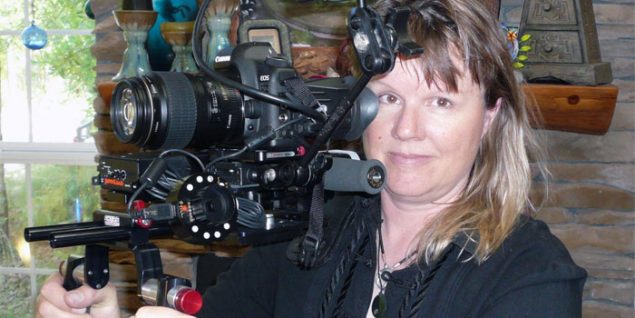You can hear more from Jill about her journey to become an underwater filmmaker here.

About the Job
What is your title?
I am a professional underwater filmmaker and photographer.
Where do you work?
I own an independent production company that specializes in highly technical underwater environments.
Do you travel often? To where?
I am fortunate to have many opportunities to travel through my work. I have journeyed to Antarctica to be the first to swim inside iceberg caves. I have explored lava tubes inside the Monte Corona Volcano in Lanzarote and dived in caves from Russia to Australia to Central America.
What are the educational requirements for your job?
I have a rather interesting educational background. I earned a Bachelor of Fine Arts in Visual Communications Design at York University and combined more than 20 years of diving experience and educational programs to create a hybrid career. I am dedicated to engaging in continuing education opportunities as they present themselves. These days, it is critical to stay on the cutting edge of technology in my underwater pursuits as well as in image making. If I start to slide behind the curve, then somebody else may slip into the void. Staying ahead of the curve keeps me busy!
What is the salary range for someone with your type of job?
There is quite a wide range of compensation for the type of work that I do. My career includes technical diving instruction, underwater photography, underwater filmmaking, writing, publishing books, and consulting as a specialist in the technical aspects of diving. That means there are very different scales of compensation. Books provide royalty checks. Films may pay out on distribution or be engaged as work for hire. Consulting work may be paid by the project or by the hour. I have earned as much as $325 per hour for some jobs or $400 – $800 per day for others.
How many hours do you work per week?
My work and passion overlap significantly. My edit suite is upstairs in my home and my technical diving equipment fills the garage. The overlap means that my work hours are long. I probably work 70-80 hours per week, but I can drop everything and go for a swim in the middle of the day or take my kayak out on a beautiful river. I can write a script on my boat in Canada or take an afternoon to grab some stock photos of a local underwater cave.
Job Duties
Tell us about your research and the types of things you do.
In the past couple of years I have written and published three books, completed an independent documentary, appeared in a commercial and documentary series for Honda, spoken in six different countries, visited with school children, traveled to international conferences, written briefs for lawyers, consulted on training programs for major diving agencies, instructed new cave divers, maintained a rebreather blog, explored thousands of feet of underwater cave passages never seen by man, and provided photojournalism for magazines around the world.
What is the most fascinating thing you have ever seen or done?
Being the first person to explore caves inside of Antarctic icebergs was a highlight in my career. We traveled across the Southern Ocean for 12 days to reach the Ross Sea. We intercepted the largest moving object on the planet, the B-15 iceberg. It was an early look at global climate change and a journey I will remember for all of my life.
What are the personal rewards of your work?
When you run an independent company, there is always worry about where your next contract will come from, but the rewards far outweigh the challenges. I can answer my email in my pajamas, call my own shots, and choose to take some time off when needed. Being able to explore places never seen by humanity is the ultimate reward.
How does your work benefit the public?
My greatest passion is to educate people about how they are connected to their water resources. I have a particular interest in freshwater. Without clean freshwater, humanity and our oceans both suffer. I hope that my documentary films and speaking engagements stimulate water literacy that helps people understand where their drinking water comes from, how they pollute it, and how they may protect it for future generations and the health of our world’s oceans. I also hope that my work as an explorer and diving educator fosters good role model behaviors and practices that create a safer environment for future divers.
What else could someone with your background do?
When you have a thirst for learning, nothing is impossible. If you work hard, take educational opportunities seriously, and focus on personal improvement, you can do anything you set your mind to.

